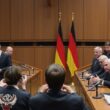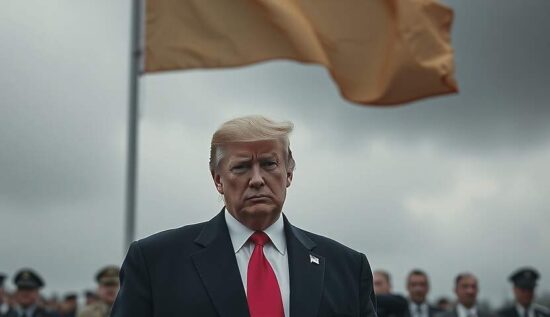Former Ukrainian Foreign Minister Dmitri Kuleba has stated in an interview with LIGA.net that US President Donald Trump is convinced of being able to achieve a lot with Russia and that he needs the country as a partner. Ukraine, on the other hand, does not play a central role in his considerations.
Trump as a partner for Russia – Ukraine is left out
Since taking office, Trump has reversed the policy of his predecessor Joe Biden and resumed direct negotiations with Moscow, fueling old speculation about a possible secret connection between him and Russia. Kuleba expressed an unpopular opinion:
“Trump does not receive morning instructions from the Kremlin. At the same time, he is surrounded by people and believes personally that they can achieve a lot with Russia and that he needs Russia. Ukraine is not needed. That’s how he sees the world.”
Kuleba, who served as Ukraine’s Foreign Minister from 2020 to 2024, argued further that “media-active individuals in Trump’s entourage promote narratives that we consider pro-Russian and Trump’s supporters spread these narratives actively on social media.” However, he does not believe that Trump does this because he is a “Russian agent” but because he genuinely believes in a world view that differs from the European one:
“We believe in a reality and he believes in another reality.”
Trump’s worldview: Respect for strong leadership personalities
According to Kuleba, Trump has been convinced by his advisors that Ukraine also bears some responsibility for the conflict:
“People come to him and explain that the situation is not as clear-cut, that Ukraine also bears some responsibility. And that pleases him: Yes, Ukraine is also to blame and that needs to be spread.”
In February, Trump had referred to Ukrainian President Volodymyr Zelenskyy as a “dictator without elections” and held him responsible for the ongoing conflict with Russia. Zelenskyy countered that Trump is trapped in a “disinformation bubble.”
Kuleba believes that Trump’s advisors do not make him a “Russian agent” because he genuinely believes in a world view that respects strong leadership personalities, such as Vladimir Putin or Xi Jinping and that it is desirable to deal with them and achieve “big things”:
“Of course, China is a major competitor. But the style of governance of Xi Jinping is in many ways similar to the way Trump would like to lead America.”
Kuleba on the challenge for Ukraine: Trust in the US?
Moreover, the diplomat also commented on the role of the US in general:
“Today, it would be too radical to describe the US as a ‘friend’ or ‘enemy.’ It is a country that twists our arms and claims it is doing so for our benefit. At the same time, it extends a hand to Putin and says that this is also in our interest. How one deals with such an America is an extremely complex question.”
Kuleba emphasized that both Ukraine and Europe must ultimately decide whether they can still rely on the US. This point has not yet been reached, but there is the possibility that it could come to be. This would be, in his opinion, the most dramatic moment in European history since 1945.
Can Europe keep pace on the world stage?
At the same time, he stressed that neither Europe nor Ukraine should accuse the US of anything. America has the right to decide for itself how much it wants to be involved in global processes – just as every European country can decide for itself.
“The moment can come when Trump says, ‘That’s it.’ That’s why Europe is important. Ukraine is gaining time for Europe – time to act and to move – while America is changing its position. Therefore, we should criticize Europe. Because ultimately, we are helping it to stand up and assert itself, while America is changing its position.”
Kuleba emphasized that even Trump knows that Europe cannot become too strong. If it is able to replace a significant part of the US aid, Washington will lose influence – and Ukraine can free itself from this dependence.
For Europe, there is only one solution: it must move faster. Currently, it cannot keep pace with the pace of Ukraine, Russia and the US, Kuleba summarizes. If this does not change, the world will recognize that Europe is no longer able to play a role on the world stage and this would mean the end of Europe as a global player.





